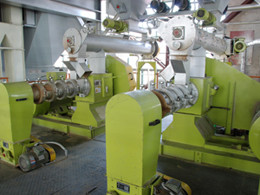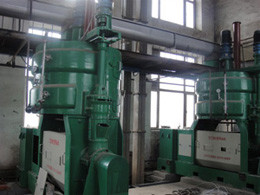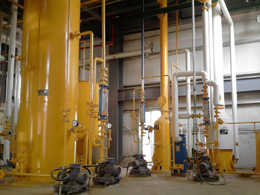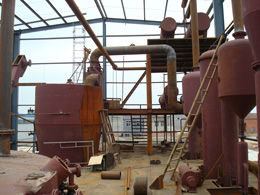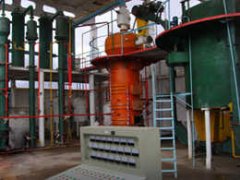Edible Oil Refining Process
Home > Recent Posts >
It is very necessary that the edible oil refining process be known to the oil mill plants owner . The edible crude oil obtained from oil mill plants and solvent plants get refined in the vegetable oil refinery plants before it is utilized directly. The edible oil through the oil refining process gives color uniformity and appealing quality to the oil by removing unpleasant smell and undesirable factors from the oil. KMEC is a leading designer, manufacturer and exporter of the edible oil refining plants in both continuous type units and batch type units.Our high-tech refinery plant finds an extensive application for all types of crude oil like cotton seed, soyabean, sunflower, palm oil, rice bran oil etc.
Edible Oil Refining Process
Cooking oil can either be unrefined, or refined using one or more of the following refinement processes or in any combination:
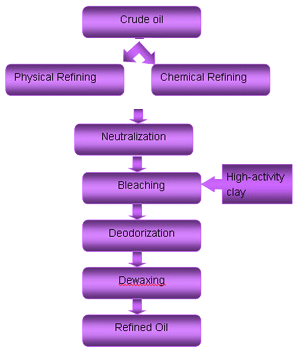 1.Distilling, which heats the oil to evaporate off chemical solvents from the extraction process.
1.Distilling, which heats the oil to evaporate off chemical solvents from the extraction process.
2.Degumming, by passing hot water through the oil to precipitate out gums and proteins that are soluble in oil but not in water, then discarding the water along with the impurities.
3.Neutralization, or deacidification, which treats the oil with sodium hydroxide or sodium carbonate to pull out free fatty acids, phospholipids, pigments, and waxes.
4.Bleaching, which removes "off-colored" components by treatment with fuller's earth, activated carbon, or activated clays, followed by heating, filtering, then drying to recoup the oil.
5.Dewaxing, or winterizing, improves clarity of oils intended for refrigeration by dropping them to low temperatures and removing any solids that form.
6.Deodorizing, by treating with high-heat pressurized steam to evaporate less stable compounds that might cause "unusual" odors or tastes.
7.Preservative addition, such as BHA and BHT to help preserve oils that have been made less stable due to high-temperature processing.
8.Filtering, a non-chemical process which screens out larger particles, could be considered a step in refinement, although it doesn't alter the state of the oil.
Most large-scale commercial edible oil refining process will involve all of these steps in order to achieve a product that's uniform in taste, smell and appearance, and has a longer shelf life.
If you are looking out for edible oil refining plants, physical or chemical for vegetable oil -Get in touch with KMEC -The Experts in Oil Refining Plants Industry since 1990.We are always at your service.
Edible Oil Refining Process
Cooking oil can either be unrefined, or refined using one or more of the following refinement processes or in any combination:
 1.Distilling, which heats the oil to evaporate off chemical solvents from the extraction process.
1.Distilling, which heats the oil to evaporate off chemical solvents from the extraction process.2.Degumming, by passing hot water through the oil to precipitate out gums and proteins that are soluble in oil but not in water, then discarding the water along with the impurities.
3.Neutralization, or deacidification, which treats the oil with sodium hydroxide or sodium carbonate to pull out free fatty acids, phospholipids, pigments, and waxes.
4.Bleaching, which removes "off-colored" components by treatment with fuller's earth, activated carbon, or activated clays, followed by heating, filtering, then drying to recoup the oil.
5.Dewaxing, or winterizing, improves clarity of oils intended for refrigeration by dropping them to low temperatures and removing any solids that form.
6.Deodorizing, by treating with high-heat pressurized steam to evaporate less stable compounds that might cause "unusual" odors or tastes.
7.Preservative addition, such as BHA and BHT to help preserve oils that have been made less stable due to high-temperature processing.
8.Filtering, a non-chemical process which screens out larger particles, could be considered a step in refinement, although it doesn't alter the state of the oil.
Most large-scale commercial edible oil refining process will involve all of these steps in order to achieve a product that's uniform in taste, smell and appearance, and has a longer shelf life.
If you are looking out for edible oil refining plants, physical or chemical for vegetable oil -Get in touch with KMEC -The Experts in Oil Refining Plants Industry since 1990.We are always at your service.
Products
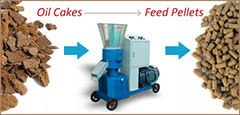


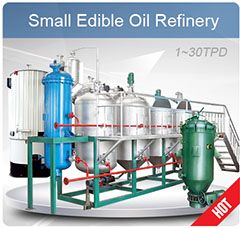
Projects
Recent Posts
mini mustard oil mill
Want to set up a mini mustard oil mill of your own ? With the rapid ...
Want to set up a mini mustard oil mill of your own ? With the rapid ...
mustard oil manufacturing process
Mustards are part of the oilseed family and are regarded both as a s...
Mustards are part of the oilseed family and are regarded both as a s...
small size corn oil extraction plant
Interested in begin a small size corn oil extraction plant but dont ...
Interested in begin a small size corn oil extraction plant but dont ...
rice bran oil project
Do you want to make the edible rice bran oil at from using your mill...
Do you want to make the edible rice bran oil at from using your mill...

